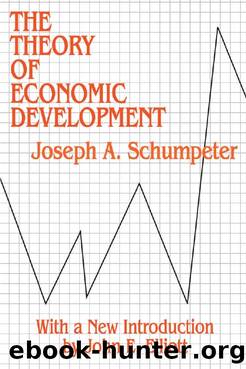The Theory of Economic Development: An Inquiry Into Profits, Capital, Credit, Interest, and the Business Cycle by Joseph A. Schumpeter

Author:Joseph A. Schumpeter
Language: eng
Format: mobi, azw3, epub
Tags: Non-Fiction, Sociology, Finance, Business, Economics, Entrepreneurship, Society, Politics, Social Science
ISBN: 0878556982
Publisher: Transaction Publishers
Published: 1934-12-12T06:00:00+00:00
Notes
1 The line of thought that is expounded fundamentally unchanged in the following has in the meantime received valuable substantiation and improvement from the investigations of A. Hahn in his Volkswirtschaftliche Theorie des Bankkredits (1 ed. 1920, 2 ed. 1926). The reader is expressly referred to this original and meritorious book, which has essentially advanced our knowledge of the problem. Also in many respects parallel is W. G. Langworthy Taylor in The Credit System. Perhaps the post-war phenomena and the discussions of the rôle of bank credit in boom and depression have removed from what I have to say much of the appearance of a paradox. To-day every theory of the business cycle considers the fact of âadditional creditâ in prosperity and takes account of the question, raised by Keynes, whether the cycle may be mitigated by being influenced from the money side. This does not yet mean the acceptance of my point of view. But it must lead to it. Cf. also my article âKreditkontrolleâ in the Archiv für Sozialwissenschaft und Sozialpolitik (1925). Recently Robertson, in Banking Policy and the Price Level, has arrived at similar results (cf. on this Pigou, Economic Journal, June, 1926).
2 The theoretical construction which this unreal conception has enforced since Quesnay's day thus refutes itself. And it is so important that one may speak of âadvances-economicsâ (Vorschussökonomie).
3 Although one may not in general add up claims to goods and the goods themselves â any more than the ear and the grains of corn â yet the matter is clearly somewhat different here. While I cannot ride on a claim to a horse, I can, under certain conditions, do exactly the same with claims to money as with money itself, namely buy.
4 Cf. J. S. Mill. Moreover, every economist will admit that Ricardo's statement is not quite correct, even if he is ever so conservative on this point. Cf. for example J. L. Laughlin, who says in his Principles of Money: âCredit does not increase capital (that is means of production) but mobilises it and makes it more efficient and thereby leads to an increase in product.â We shall have something similar to say.
5 Only a few banks show in their periodical statements what part of their deposits consists of real deposits. The above estimate is based upon English statements, which show it at least indirectly, and probably amounts to a communis opinio. This does not hold good for Germany, for example, because there it is not the practice simply to credit a customer with the amount of the loan. However, the essence of the theory is not on this account different. Strictly speaking, moreover, all bank deposits are based upon mere credits, as Hahn rightly emphasised â only that credits which arise out of âsums paid inâ are covered in a special manner and do not increase the purchasing power of the depositors.
6 Of course there are always theorists who take the layman's standpoint, who regard with astonishment âthe gigantic sums in the banks.â It is more surprising that financial writers sometimes take a similar line too.
Download
The Theory of Economic Development: An Inquiry Into Profits, Capital, Credit, Interest, and the Business Cycle by Joseph A. Schumpeter.azw3
The Theory of Economic Development: An Inquiry Into Profits, Capital, Credit, Interest, and the Business Cycle by Joseph A. Schumpeter.epub
This site does not store any files on its server. We only index and link to content provided by other sites. Please contact the content providers to delete copyright contents if any and email us, we'll remove relevant links or contents immediately.
Harry Potter and the Goblet Of Fire by J.K. Rowling(3046)
Never by Ken Follett(2882)
Shadow of Night by Deborah Harkness(2718)
Ogilvy on Advertising by David Ogilvy(2682)
Zero to IPO: Over $1 Trillion of Actionable Advice from the World's Most Successful Entrepreneurs by Frederic Kerrest(2396)
The Man Who Died Twice by Richard Osman(2300)
Machine Learning at Scale with H2O by Gregory Keys | David Whiting(2292)
Book of Life by Deborah Harkness(2263)
How Proust Can Change Your Life by Alain De Botton(2261)
My Brilliant Friend by Elena Ferrante(2224)
0041152001443424520 .pdf by Unknown(2220)
The Tipping Point by Malcolm Gladwell(2204)
How to Pay Zero Taxes, 2018 by Jeff A. Schnepper(2100)
Will by Will Smith(2043)
Purple Hibiscus by Chimamanda Ngozi Adichie(1982)
Hooked: A Dark, Contemporary Romance (Never After Series) by Emily McIntire(1960)
Borders by unknow(1786)
Rationality by Steven Pinker(1765)
Daughter of Smoke and Bone by Laini Taylor(1744)
